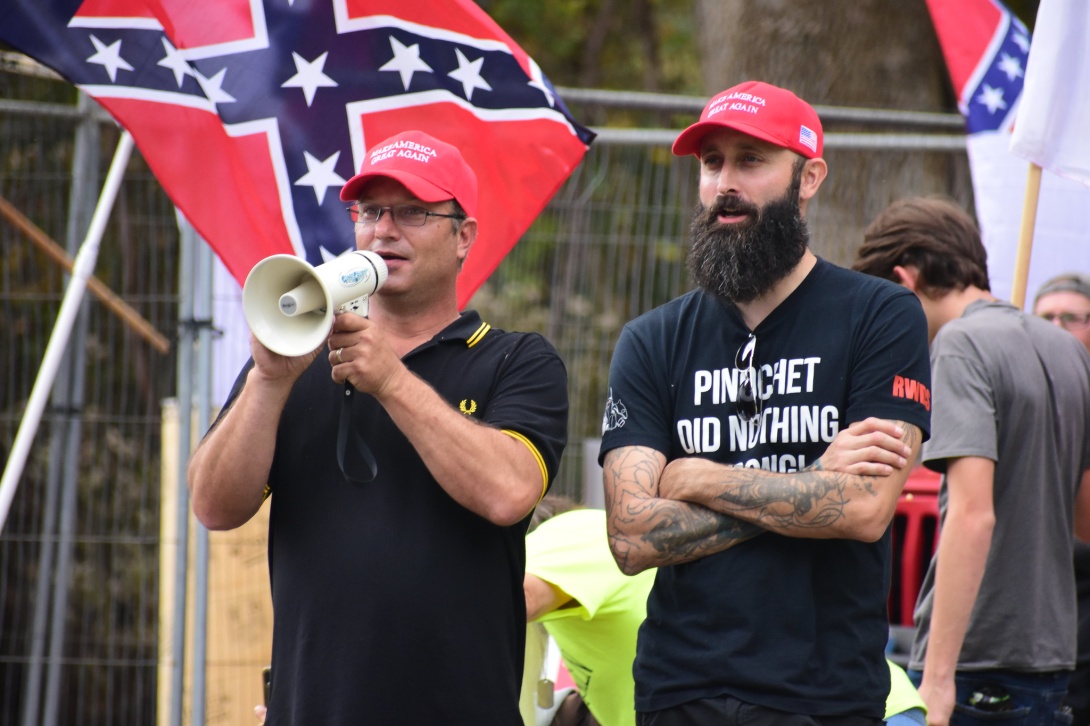INSTITUTE INDEX: Confronting the GOP's poll watcher threats

Given recent statements by President Trump and other Republican leaders, voting rights advocates are concerned about intimidation at the polls this year by violent far-right groups like the Proud Boys, whose members are seen here at a 2019 rally in Pittsboro, North Carolina, in defense of a Confederate monument. (Photo by Anthony Crider via Flickr.)
Hours after the start of the Sept. 29 presidential debate between President Trump and former Vice President Joe Biden — in which Trump refused to condemn white supremacists, made false claims about voter fraud, and urged his supporters to "go into the polls and watch very carefully" — that Virginia Attorney General Mark Herring issued a Tweet saying "voter harassment and intimidation will not be tolerated" in his state: 14
Number of days before the debate that Herring issued an advisory opinion outlining protections in both state and federal law against voter intimidation in response to reports of activity near polling places that led some voters to fear for their safety: 5
Date on which a group of Trump supporters waving campaign flags disrupted early voting in Fairfax County, Virginia, by rallying near the entrance to a polling place following a "Trump Train" parade led by Republican National Committee (RNC) Co-Chair Thomas O. "Tommy" Hicks Jr. of Dallas: 9/19/2020
Year in which the RNC, after a lawsuit over its hiring of off-duty police to monitor polling places in Black and Latino communities in New Jersey as part of a so-called "ballot security" operation, signed a consent decree pledging to end intimidation of Democratic voters though admitting no wrongdoing: 1982
According to RNC officials, number of voters another one of their 1980s-era so-called "ballot security" efforts was expected to kick off Louisiana's rolls in an effort the officials said was designed to "keep the Black vote down": 60,000 to 80,000
Year in which the consent decree expired despite Democrats' attempts to get it extended, making the 2020 presidential election the first without its protections in 40 years: 2017
Date on which President Trump, in a private meeting with civil rights leaders at Trump Tower, acknowledged that lower turnout among Black voters helped him defeat Hillary Clinton: 1/16/2017
Year in which Justin Clark, an attorney and Trump reelection campaign official, was recorded telling Republican lawyers that the expiration of the consent decree was a "huge, huge, huge, huge deal": 2019
Number of people the Republican Party is now aiming to recruit to serve as what it calls "poll watchers" to look for election problems, raising concerns about possible voter intimidation: 50,000
Date on which Roger Stone — the longtime Trump confidant convicted of felonies for witness tampering and lying to investigators in the Russia election interference case and whose sentence was commuted by the president — appeared on the radio show of Dallas-based far-right conspiracy theorist Alex Jones and said the only legitimate outcome to the 2020 election would be a Trump victory: 9/10/2020
Date on which, Stone, who has Proud Boy ties, organized what became known as the "Brooks Brothers riot" — a violent protest involving George W. Bush campaign operatives who targeted a meeting of election canvassers in Florida's Miami-Dade County during the 2000 presidential recount and succeeded in shutting it down, ultimately leading Al Gore, who won the popular vote, to concede: 11/22/2000
Of the 50 states, number with statutes regulating poll watchers, also known as "partisan citizen observers": 45
Of the 13 Southern states*, number with poll watcher statutes: 13
Number of provisions of federal law that also bar voter intimidation, some of which impose lengthy prison sentences: 6
Factor by which the Lawyers' Committee for Civil Rights Under Law, a voting rights advocacy group, has boosted its squad of attorneys who'll be on call to help voters who experience intimidation or other problems at the polls this year: 4
Number of attorneys now helping that effort nationwide: more than 21,000
Phone number that voters who experience problems can call to get help from those attorneys: 866-OUR-VOTE
* Facing South counts among the Southern states Alabama, Arkansas, Florida, Georgia, Kentucky, Louisiana, Mississippi, North Carolina, South Carolina, Tennessee, Texas, Virginia, and West Virginia.
(Click on figure to go to source.)
Tags
Sue Sturgis
Sue is the former editorial director of Facing South and the Institute for Southern Studies.
